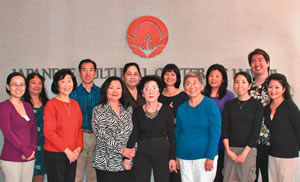Promoting Japanese Culture

By Lenny Yajima Andrew
President/Executive Director, Japanese Cultural Center of Hawaii
From the time I was 3 years old, I tagged along with my parents to cultural events at the Japanese Consulate, Japanese Chamber of Commerce and to countless samurai and Tora-san movies.
My family has been very active in the community. My father was chairman of the first Cherry Blossom Festival Queen Contest and general chairman of the fourth Cherry Blossom Festival. My grandfather, Steere Noda, started the Asahi baseball team in Hawaii. My grandmother,Alice Noda, was the first U.S. citizen president of the Japanese Women’s Society of Hawaii. After all these years, my mother, Lillian Yajima, remains active in the Japanese Women’s Society, United Japanese Society, Cherry Blossom Festival and here at the Japanese Cultural Center of Hawaii. I feel as though I’ve come full circle to where I’m supposed to be, and carry an obligation to further the work and legacy of my grandfather, grandmother, father and mother.
The cultural center is a vibrant resource dedicated to educating our diverse community about the evolving Japanese American experience in Hawaii. One of the largest community education programs at the center is the historical gallery, featuring the permanent exhibit titled Okage Sama De: I am who I am because of you, which chronicles the history of the first Japanese immigrants to Hawaii and their legacy. A revolving community gallery showcases local artisans in a variety of timely exhibits. There is free admission to our gallery on the second Saturday of each month. The gift shop features “things Japanese” along with books, DVDs, CDs and artwork.

Our resource center serves the community by providing public access to a reference collection of more than 8,000 books in English and Japanese, photos, and archival collections of manuscripts, oral history transcripts, newspapers, pamphlets and audio-visual material.
We have had our challenges, and many of you may recall the Save the Center effort in 2003, where the community came together and dollar by dollar raised enough to retire a large debt. We are proud to say that in the past several years the center has achieved financial stability with a balanced operating budget and fully leased office spaces. The most recent tenants are KZOO Japanese radio, Nippon Golden Network (NGN) Japanese television and Pacific Resource Realty. Our other tenants include the Honolulu Japanese Chamber of Commerce, Rainbow Gakuen (Japanese Language School), United Japanese Society, Manoa Grand Ballroom and Diagnostic Laboratory Services.
One of the few Japanese-built dojo on Oahu is here at the center. The Kenshikan Dojo is active seven days a week with students learning karate, aikido, kendo, butoh and yoga.
Chado (the way of the tea) tea classes are held in the Seikoan tea house by Urasenke Foundation of Hawaii, Edosenke Fuhaku Kai Hawaii Shibu and Omotesenke Hawaii Shibu. On any given day, it’s not unusual to see men and women dressed in kimono walking around the courtyard going to tea classes. Kumihimo (Japanese braiding) classes are held the first and second Saturdays of each month. This type of braiding is done on a loom and the braiding is so strong that it was used on samurai warrior clothing and equipment. Shodo (Japanese calligraphy) classes are conducted by Tokakai Calligraphy on Saturdays (except second Saturdays). Taisho koto classes also are available.
With nearly 5,000 members, we offer an array of memberships, including corporate and mutual benefits such as discounts at golf courses statewide (Hawaii Prince, Kapalua Plantation, Makalei, Olomana, Poipu Bay, Pukalani, Pearl, Puakea, Luana Hills) to restaurants (Hakone, Prince Court, Naniwa-ya Ramen) to retailers (Shirokiya, Hakubundo, Nuimono, Morning Glory) to discounts at our own gift shop, classes and workshops, to name a few. I encourage you to become a member to keep informed about our programs, activities and benefits.
My hapa children are so lucky to live in Hawaii. They have opportunities to attend the many ethnic festivals offered year ‘round and can identify with their Japanese heritage thanks to numerous cultural events at the center. I want my generation, my children, their friends and their children - the yonsei, gosei and rokusei generations of all ethnicities - to know that the center is here for them. They’ll be able to come here when the time is right to embark on their quest to research their roots or to learn about Japanese traditions and culture, and share with others.
E-mail this story | Print this page | Comments (0) | Archive | RSS Comments (0) |
Most Recent Comment(s):




 Del.icio.us
Del.icio.us








